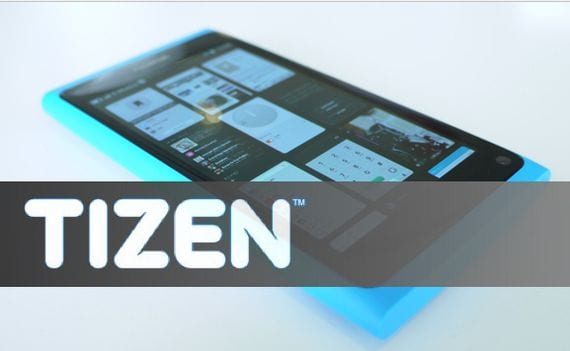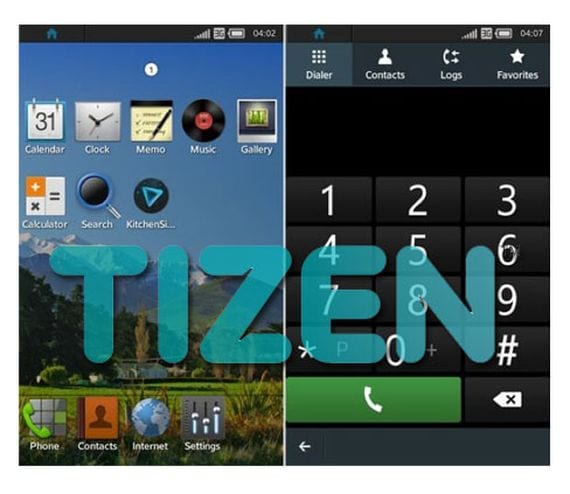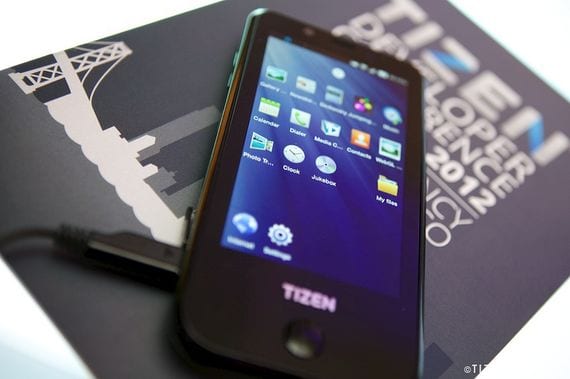
Tizen is a new Linux-based operating system what do you want to do entry into the world of technology, and that in the coming months we will undoubtedly hear a lot about him.
The project led by large companies such as Samsung, HTC e Intel, has the support of the Linux Foundation and comes, presumably to get a piece of the exquisite cake that sales of mobile devices with OS, the aptly named Smartphones.
What exactly is Tizen?
Tizen is the name of an ambitious project, of a Linux-based operating system and totally open to new ideas and developers, its SDK is now available for download from Tizen's own website.
The operating system in question bases its application development interface on HTML5 and other web standards like javascript, although the libraries of the Enlightenment Foundation, with which the range of development possibilities increases considerably.

Tizen, in principle wants to be the driving force behind the great sales of other mobile operating systems such as Apple iOS o Google Android,
This new operating system is intended to be totally free and at the disposal of anyone who intends to investigate with it, both to improve it and manipulate it at will or adapt it for any terminal that is possible and that its hardware allows it.
It is rumored that Samsung could launch its first devices with Tizen, and we hope that before the end of this year we already have a model in our hands to be able to comment and compare it with current operating systems.

The Tizen project in addition to covering the world of mobile devices as Tablets and smartphones or Smartphones, goes further and wants to implement to TVs, Netbooks and other products that surely in the coming years, if everything goes as planned, will flood the shelves of the main technology stores around the world.
More information - Video-tutorial to install a theme in Cairo-Dock
Download - Tizen SDK
Correct me if I'm wrong, but I think Tizen is based on Debian. Tizen comes from Meego, which in turn comes from Maemo, which in turn is Debian. In other words, we are talking about a Debian Smartphone; again. What is Tizen going to contribute that Maemo didn't already have? Why is this going to triumph over the other Linux?
Simply because there are great economic interests in the sector of Smartphones, and this time companies as large as Intel, Samsung and HTC have gathered.
I think that the Linux Foundation already participated in a project called Limo a long time ago, in which there were also many renowned companies such as Samsung, Vodafone and more that I do not remember. I had the mobile that they took out and it was very very powerful compared to the others on the market but that particular System ruined it since no developer did anything for it and without applications the mobile became the worst mobile I ever had.
I don't know about myself but it gives me that this will follow the same path, I hope I'm wrong ...
I believe that this will mark a change and a before and after in the world of mobile operating systems.
It cannot be that two companies dominate the entire mobile OS market.
The article is not bad, but I think there is a lot of information missing, especially about its origins and its current situation, with no intention of offending.
I have been following this project for a long time, rather from all its predecessors, which are not few, as well as the illusions that have been lost along the way, I hope that this one does see the light in conditions.
The argument of the important companies on their backs can strengthen certain hopes, but make no mistake, many other projects of this type came to nothing despite having a large number of companies behind and with much, much renown. A clear example is Tizen's father.
We also don't "sweep home so much" with the Debian theme. Although it is based on Debian it does not mean that it is a Debian, and even less so when there have been so many "generational changes" according to the legacy projects.
All this started with Maemo by Nokia (for smartphones), when Nokia was still one of the big ones and not now that they have no market share) and Moblin by Intel. You can already see large companies involved in its developments.
When Maemo failed to take off and Moblin appeared with some development force in an emerging netbook market, both projects were unified in what became known as MeeGo, a fully multiplatform operating system for smartphones, netbooks, information displays, audiovisual systems in cars and many other devices.
Things were going very well, development was still quite strong and many other companies became partners in this project. Big companies like Intel and Nokia themselves and big car brands and a considerable etc.
The project was stalling, mainly because of the little time, money and resources invested by Nokia, which made a terrible move. Other companies like HTC first and Samsung later bet very strongly on Android. Nokia still offered an outdated Symbian and had no real alternative to cope with emerging smartphones. What did you do? In addition to not betting heavily on MeeGo in the beginning, they did not do it when it began to be seen that it was going to be late. Eventually they completely bypassed MeeGo and made a deal with Windows to release Windows Phone devices. Today Nokia has hardly any presence in the market. Check how many relatively new mobiles your friends and family have that are Nokia, and how many with an HTC or Samsung.
Despite everything, Intel continued with the project a bit while they looked for another solution without discarding MeeGo. The result was Tizen, son of MeeGo, grandson of Moblin and Maemo and great-grandson of Debian (those who want to consider it).
As I said, the changes between project inheritance are quite significant. For example MeeGo opted for an interface based on QT (at that time owned by Nokia, which it sold a few weeks ago). On the other hand, Tizen got rid of this option and opted for what is mentioned in the news: HTML5, js and Enlightement libraries, I think that still offering backward compatibility with MeeGo applications so as not to lose the work of the community. Tizen already has one year of life, the SDK was published months ago and although some of us remain expectant, the deadlines are not being met because the first devices were going to appear in the last quarter of this year (April-June), which still sows certain doubts and even more so with the history behind it. I think it is an interesting project that is not being widely echoed in general, which does not benefit the project at all, since it is very important that when an OS of this type comes out on the market it does so now with a certain ecosystem of applications that gives more force in this complicated beginning flooded by Android or IOS. If there are not many applications that users can use, nobody is going to get rid of their Android because in Tizen they do not have the X or the Y application, and it will not be more than a curiosity. At least in the beginning, of course this ecosystem can explode later, but it will be much more difficult for Tizen to take market share than if it makes the user not miss their Android / iPhone from the beginning.
Very good, you can see that you are passionate about the subject.
Thanks for documenting us all.
Do not see son of, grandson of, this looks like the Lord of the Rings, haha, I remember the disaster of «Bada», what a piece of mobile with such a bad system .. but how many companies want to have a niche in the market of the mobiles? , It would be nice if you post some of those attempts ,, jjjj ,, Google, Appel, Windows, Ubuntu, Tizen, Bada, Symbian, and blah blah blah, which one is convenient ?, which one is more free ?, I don't know things So